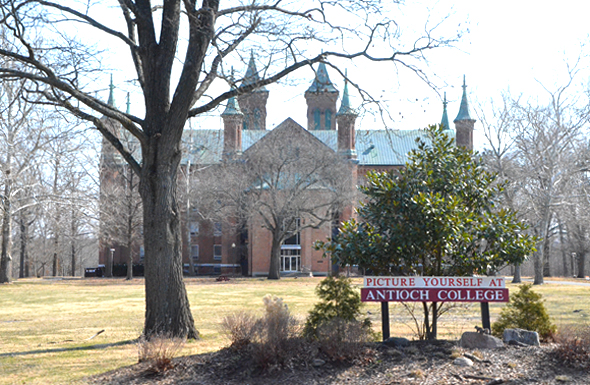
(Photo by Reilly Dixon)
Antioch College earns Federal Work College designation
- Published: August 15, 2024
In a move towards promoting equitable access to higher education, Antioch College was officially designated as a Federal Work College earlier this summer.
The Federal Work College designation, granted by the U.S. Department of Education, recognizes institutions that integrate work experience into their academic programs, fostering a holistic approach to education.
This new status aligns with Antioch’s long-standing ethos of fusing learning, work and community service — a model the college has championed since its inception in 1850 — in ways that level the playing field for access to higher education.
Antioch College’s Dean of Cooperative, International and Community-based Learning Luisa Bieri Rios sat down with the News in a recent interview to discuss what the new status means for the college and its community.
“The Federal Work College model is about providing access to a college education for all students,” Bieri Rios told the News. “For anyone who can’t otherwise afford it — for students who maybe aren’t thinking about college but could be or should be if affordability wasn’t an issue.”
She highlighted the alignment of this model with Antioch’s educational model: “It’s similar to our three C’s at Antioch: classroom, co-op, and community,” Bieri Rios said.
The Federal Work College system is an evolution of the traditional work-study program. While the latter typically benefits students from lower-income backgrounds, the work college model mandates that every student living on campus must work, regardless of their financial background.
“At Antioch, our student body is about 80% Pell eligible,” Bieri Rios said, referencing Pell Grants, which are awarded to full-time students who display financial need. “The Federal Work College status allows us to leverage more federal dollars to support these students, making college more accessible and affordable.”
She added: “You also don’t have a certain set of students working for another group of students who, because they could afford college, didn’t have to work for it. Everybody works — everybody does it.”
Antioch College has experiential learning at its core. For over a century, the college has emphasized experiential learning through its co-op programs. Established during Arthur Morgan’s presidency in the 1920s, those programs have become integral to the college’s identity. In recent years, Antioch introduced the Antioch College Works Campus Jobs Program, which allows students to work part-time on campus during their study terms.
“We have always valued the synergy between classroom learning, co-op experiences, and community engagement,” Bieri Rios said. “This aligns very much with the Federal Work College model, where students are working during their study terms and contributing to the life of the college in all different areas.”
Bieri Rios noted that the path for Antioch to become a Federal Work College was not straightforward.
“We had a quick turnaround to explore this opportunity,” she said. “By June of last year, we provided a recommendation to [President Jane Fernandes], and the board decided to pursue the application.”
The application process included rigorous documentation, culminating in a 136-page submission detailing Antioch’s commitment to student work over the preceding two years.
“It felt like a big win when we were notified in February that our application was approved,” Bieri Rios said with a smile.
She added that the transition to becoming a Federal Work College has been met with enthusiasm from students and parents alike. Beginning in the fall of 2024, all residential students will be required to contribute at least five hours per week to a campus job. In exchange, they will receive a $4,500 work grant applied directly to their tuition.
“Students are pretty excited about where they get to work,” Bieri Rios said. “They create a cohort of friends and community members who are working together with staff and faculty.”
Popular work areas include the Olive Kettering Library, the Antioch Farm, and the Foundry Theatre.
“I’m pretty excited about our farm-to-table kitchen crew,” Bieri Rios added.
This initiative connects Antioch’s micro-farm directly with campus dining, offering students hands-on experience in sustainable agriculture and food service.
The Antioch Federal Work College model also emphasizes community engagement. Antioch’s learning hubs, such as the Coretta Scott King Center, Wellness Center, the recently revived Antioch Review and the Foundry Theater, play a crucial role.
“Each of our learning hubs offers opportunities not exclusively to our students but to a broader, wider public,” Bieri Rios said, adding that collaborations with area organizations, such as the Dayton International Peace Museum, further strengthen these ties.
Becoming a Federal Work College brings both financial benefits and challenges. Antioch will receive a $275,000 grant for the coming year, with the expectation that the college matches these funds.
“We hope this amount will increase somewhat, but we are being conservative in our approach,” Bieri Rios said, noting that the college is also seeking additional funding to support its programs.
“This past year, we received a generous grant from the Kettering Family Philanthropies,” she said. “We are hopeful that we will continue to receive grant funding and generous donations to help offset the costs of college tuition.”
Reflecting on Antioch’s history, Bieri Rios shared a story unearthed by the college’s archivist, Scott Sanders.
“One of the first students in 1853 worked in exchange for room and board,” she said. “His job was to ring the bells in Main Hall. When we received our Federal Work College designation, we rang those same bells to celebrate.”
The Yellow Springs News encourages respectful discussion of this article.
You must login to post a comment.
Don't have a login? Register for a free YSNews.com account.












No comments yet for this article.